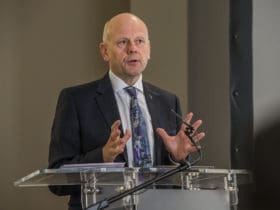Asthma UK and British Lung Foundation Wales and ASH Wales have called on Welsh Government to set out a plan to tackle increasing levels of preventable deaths in Wales’ poorest areas from respiratory conditions linked to smoking and air pollution.
Figures from the Office of National Statistics published last week found that in 2019 people living in the most deprived areas of Wales were twice as likely to die from avoidable causes than those in the least deprived.
Overall, both men (39.4% compared to 18.9%) and women (27.6% to 12.4%) were more than twice as likely to die due to a condition which is treatable or preventable through public health interventions if they lived in an area of high socio-economic deprivation.
Respiratory diseases were a major cause of these deaths with avoidable mortality rates for diseases of the respiratory system in the most deprived areas of Wales 5.5 times higher for men and 5.7 times higher for women compared in the least deprived areas.
The report states that smoking prevalence and poor air quality could be the cause of the stark differences in preventable deaths from respiratory conditions between rich and poor areas of Wales.
This reflects the charities’ concerns over the growing rates of deaths in Wales linked to poor air quality and high rates of death from lung cancer for which smoking is one of the main causes.
The ONS report states that: “The substantially higher rates observed in the most deprived areas compared to the least deprived areas could be linked to differential smoking prevalence and exposure to air pollution, with these two factors combined found to have a role in increasing risk of respiratory related mortality.”
In response both charities are now urging the Welsh Government and all political parties to set out a framework for tackling these health inequalities by reducing smoking and levels of air pollution.
Joseph Carter, Head of Asthma UK and British Lung Foundation Wales, said:“These new figures are deeply worrying and show that even before the pandemic people across Wales were suffering and dying due to preventable conditions.
“Just last year we saw a landmark ruling in the Ella Kissi-Debrah case, which proved a direct link between high levels of air pollution and morality rates. The increase in children being diagnosed with asthma also correlates to the increase of children living in poor areas of air pollution.
“With areas of high deprivation often being linked to high levels of dangerous NOx and PM2.5 pollution it’s clear that more needs to be done to tackle this growing threat which continues to invade our communities.
“Now, as we look to emerge from the COVID-19 pandemic, there has been no better time to do this. New initiatives like our proposal for ‘Diagnostic Hubs’ is one answer, as increasing the availability of services in our most deprived communities will help to improve lung health and ensure people get treated for their condition sooner.
“Air pollution costs the Welsh Government £1billion a year and unfortunately data such as this is only the tip of the iceberg. We need a new Clean Air Act for Wales as soon as possible with strengthened tools and resources available to reduce the overall exposure which directly harms our health and the future of children.”
Suzanne Cass, CEO of ASH Wales, said: “We know that smoking is a major cause of health inequalities across Wales with prevalence highest in the poorest areas at 26% compared to 11% in the least deprived areas.
“These shocking figures show just how much of an impact smoking has had on the health of these communities, with a far higher death toll from respiratory conditions in the most deprived areas of Wales.
“We are calling for targeted action to tackle smoking prevalence in the areas that need it most and for Welsh Government to commit to a target of achieving a smoke-free Wales by 2030.”
Keir Lewis is Professor of Respiratory Medicine at Swansea University. He added:
“The country that gave us Dr Tudor Hart, is still suffering greatly under what he called “the inverse-care law.
“We really do need clearer funding and much clearer delivery in smoking cessation and tobacco control, at a practical level to help these people in greatest need and stop this avoidable suffering and death.
“We know what to do. We don’t want more words but now need bolder action to do something about it.”









Leave a Reply
View Comments